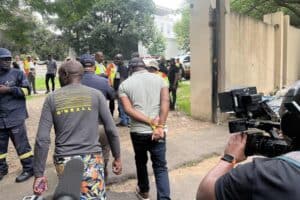UN chief Antonio Guterres travelled to the strife-ravaged town of Bangassou on Wednesday for a first-hand look at a notorious hotspot in Central African Republic's bloody conflict and to pay tribute to UN troops who have died.
Making his first visit to one of Africa’s most troubled countries since he took the UN helm in January, Guterres observed a minute’s silence and laid a wreath in memory of peacekeepers who lost their lives in the last year.
He said he came “to express solidarity, gratitude and admiration. You do extraordinarily courageous work. I am proud to be your colleague,” while acknowledging the difficulties of the operation.
Bangassou, a predominantly Christian town of 35,000 people around 700 kilometres (450 miles) east of Bangui, has been one of the areas worst hit by violence.
Seventy-six civilians and six UN troops were killed after a so-called self-defence militia, known as the anti-balaka, mounted an assault on May 13 on other armed groups.
As well as UN troops, Guterres also met members of the beleaguered population.
“I am deeply moved to witness your suffering,” he said at a camp for displaced people.
“Sadly, what is happening here in Bangassou is not unique. Thousands of other Central Africans have had to flee.”
Guterres later returned to the capital, Bangui, and spoke to victims who have claimed sexual abuse by UN peacekeepers — part of an effort to address damaging allegations that have hit the blue helmets in several missions.
– Mired in violence –
Mineral-rich but extremely poor, CAR has been battered by a three-year conflict between rival militias that began after then president Francois Bozize was overthrown.
Acting under a UN mandate, the former colonial power France intervened militarily to push out the Muslim Seleka rebels who had taken over, and the United Nations launched a peacekeeping mission in 2014.
But the country remains unstable and mired in violence, and the role of the UN peacekeepers is under cold scrutiny.
Thousands of civilians have lost their lives and half a million people have been displaced out of a population of roughly 4.5 million.
Guterres’s trip comes in the context of a looming decision by the UN Security Council on whether to renew the mandate, which expires next month, of its 12,500-troop peacekeeping force.
He is lobbying for the mandate to be renewed and for an additional 900 troops.
– Ruined town –
In Bangassou today, one of the towns most in need of additional security, occasional gunfire was routinely heard in the background, and economic activity has all but evaporated.
The police, courts, prefecture and customs buildings are all deserted and starting to be invaded by weeds.
The local radio station has closed down, and the anti-balaka militia ordered the local Tokoyo market to close, saying those who continued to do business there “would meet with death.”
The only cars on the streets are those from the UN force, MINUSCA, the office of the local Catholic archbishop and Doctors without Borders (MSF). At night the streets are completely deserted as people lock themselves in their homes.
Access to the river Mbomou, on the border with Democratic Republic of Congo, is controlled by young, gun-wielding militiamen, many of them locals, and often drunk.
A self-described anti-balaka general, “BereBere,” in recent remarks to AFP, said, “If the war has to last 15 years, we will fight. And if we have to destroy Bangassou, we will destroy Bangassou.”
– ‘Turn into a hell’ –
In CAR, the UN is being criticised in some quarters for passivity.
Concurring sources say that Muslim civilians in Bangassou sought refuge in a mosque from the anti-balaka, and were initially protected by MINUSCA but the UN force later withdrew.
The mosque’s imam was shot dead when he tried to leave.
UN troops — Portuguese special forces — ultimately escorted the Muslims to a small seminary owned by the Catholic Church. Around 2,000 are still there, but living in permanent fear of attack by the anti-balaka.
“Our (religious) affiliation is a pretext for sentencing us to death and expelling us from the land of our ancestors,” said one. “We feel we are in a prison without a roof.”
CAR is a country “that a group of criminals is trying to turn into a hell,” Guterres told people at the camp.
“I know that it’s difficult to talk about reconciliation when you have suffered. But the only solution is reconciliation, notably with justice,” he said.
“We are not going to perform miracles, all this is going to take time. I ask you to be resilient,” he said, to applause.
“Maybe things are going to change and we can leave and be free, finally,” said Mariam, 24, with a baby in her arms, who viewed the visit of Guterres as a sign of hope.






